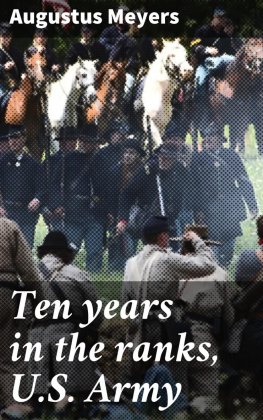PART I.
Enlistment and Service on Governor's Island, New York Harbor, in 1854.
Table of Contents
On March thirty-first, 1854, with the consent of my widowed mother, I joined the United States Army. I enlisted for a period of five years, as a musician in the general service, at the recruiting office, at No. 115 Cedar Street, New York City. My age was twelve years and nine months. I was of slender build, but in good health and passed the medical examination. After being sworn in at a notary's office in Nassau Street, I was conducted by the recruiting sergeant to the Governor's Island boat landing at the Battery; there he placed me in charge of Sergeant John Brown, cockswain of the eight-oared barge manned by soldiers from the Island. As this was then the only way for passengers to reach the Island, I had to wait a long time for the next trip of the barge, and it was late in the afternoon when we started.
There were but few passengers besides myself, a woman, a civilian or two and a few soldiers returning from "pass," more or less hilarious. After a struggle with the swift currents of the East River and considerable pitching and tossing, we landed at the Island dock near the guard-house, where I was taken in charge by a corporal of the guard who conducted me to the South Battery on the east side of the Island opposite Brooklyn, where the boys learning music were in quarters. We reported to Sergeant Hanke, who was in charge of all the non-commissioned officers and music boys in that battery.
Sergeant Hanke, after looking me over, asked whether I desired to learn to be a drummer or a fifer. When I expressed a preference for the former, he made some remarks about my slim and very youthful appearance, and advised me to think it over for a day or two. He called for Corporal Butler, who conducted me to Room No. 1 on the ground floor, to the south of the sallyport, of which he had charge.
On my entrance into the room there arose a cry of "Fresh fish" from the boys who were present. They surrounded me, asked my name, where I lived and many other questions and demanded to know whether I had any money or tobacco, taking no pains to hide their disappointment when I confessed that I had neither. The corporal, who had left the room, fortunately returned soon and relieved my embarrassing position. He assigned me to "bunk" with the only boy in the room who had no bedfellow or "bunkie."
The corporal's presence diverted the boys' attention from me for a while and gave me time to examine my surroundings. I found myself in a room with two windows that overlooked the parade ground and one facing inward towards the interior of South Battery. There were six iron double bedsteads in the room and a single bedstead for the corporal in a corner next to a window. The double bedsteads were made so that one-half could be folded up over the other half when not in use. This in a measure relieved during the day the very crowded condition at night when all the beds were down. The beds consisted of a bedsack stuffed with straw, which was rolled up in the day time, and a pair of blankets, neatly folded, laid on top. There were no sheets nor pillows for the boysthe corporal was the only one who enjoyed these luxuries, and he had provided them himself. The boys slept on the bedticks and covered themselves with their blankets when it was cold, or used one of the blankets to lie on when it was warm enough, folding up a jacket or some other piece of clothing as a substitute for a pillow.
A wide shelf around the room above the beds provided space for knapsacks, extra shoes, drums, fifes, and other objects, and on hooks under the shelf were hung the overcoats. There was a coal fire burning in the grate. A few wooden benches and a chair for the corporal in charge; this, with a water pail and a tin cup on a shelf behind the door, completed the furniture of the room.
After a while I heard a drum beat, which was the first call for "retreat." Ten minutes later, the "assembly" sounded to form ranks on the parade outside of the sallyport. The boys formed in two ranks, those who were proficient with their drums and fifes on the right. The command, "parade rest," was given by one of the sergeants, and the "retreat" played by the musicians as prescribed in the regulations. Then came the command, "Attention," and a roll call, at which each boy present answered, "Here." Some special orders were read and then at the command, "Break ranks, march," the boys rushed back to their quarters, to deposit their instruments and adjourn to the mess room in the basement for supper.
I was directed to follow, and found the mess room large enough to hold the entire company of boys at one sitting. There were long pine tables and benches without backs, all scrubbed clean. At each boy's place was a thin plate, containing a small portion of stewed dried apples, a large stone china bowl filled with black coffee (sweetened but without milk) and a slice of bread about four ounces in weight. There were iron spoons, knives and forks, and a few dishes on the table containing pepper and salt.
I asked one of the boys if they had the same kind of a supper every day, and was informed that sometimes they got molasses in place of the dried apples. As the boys finished their meager supper they left the mess room without any formality and returned to their quarters or went out to have a smoke in some place unobserved. I went back to my quarters and sat on a bench, chatting with some of the boys, who told me many things about their daily duties and the treatment they received. They all wished to leave the Island, and hoped to be sent soon to join a regiment somewhere. Some were reading books by the feeble tallow candle light, some played checkers on home-made checker boards, or amused themselves with other games.
Thus passed the evening until nine o'clock when the call for "Tattoo" sounded. There was considerably more music than at "Retreat," otherwise it was the same. There was another roll call and dismissal to quarters, where the beds were let down and the blankets spread. With a little skylarking, the boys undressed and lay down. The orderly covered the fire in the grate with ashes, "Taps" were sounded by the drummer detailed for that purpose, lights were extinguished, and all were supposed to be silent. But there was whispering and smothered laughing, which ceased only after some vigorous language and threats of reporting by the corporal.
I lay down alongside of my strange bedfellow, who kindly shared his blanket with me, my head pillowed on my jacket. There was a glimmering light from the fireplace, by which I could make out the forms of my companions and that of the corporal stretched out on his more comfortable bed in the corner. Soon all seemed to be asleep except myself. I remained awake a long time, thinking of the circumstances that had brought me here, the strange company I was sharing, and wondering what my future would be. At last, weary with the day's unusual experiences and excitements, I also fell asleep. And thus ended my first day as a soldier in the United States Army.











